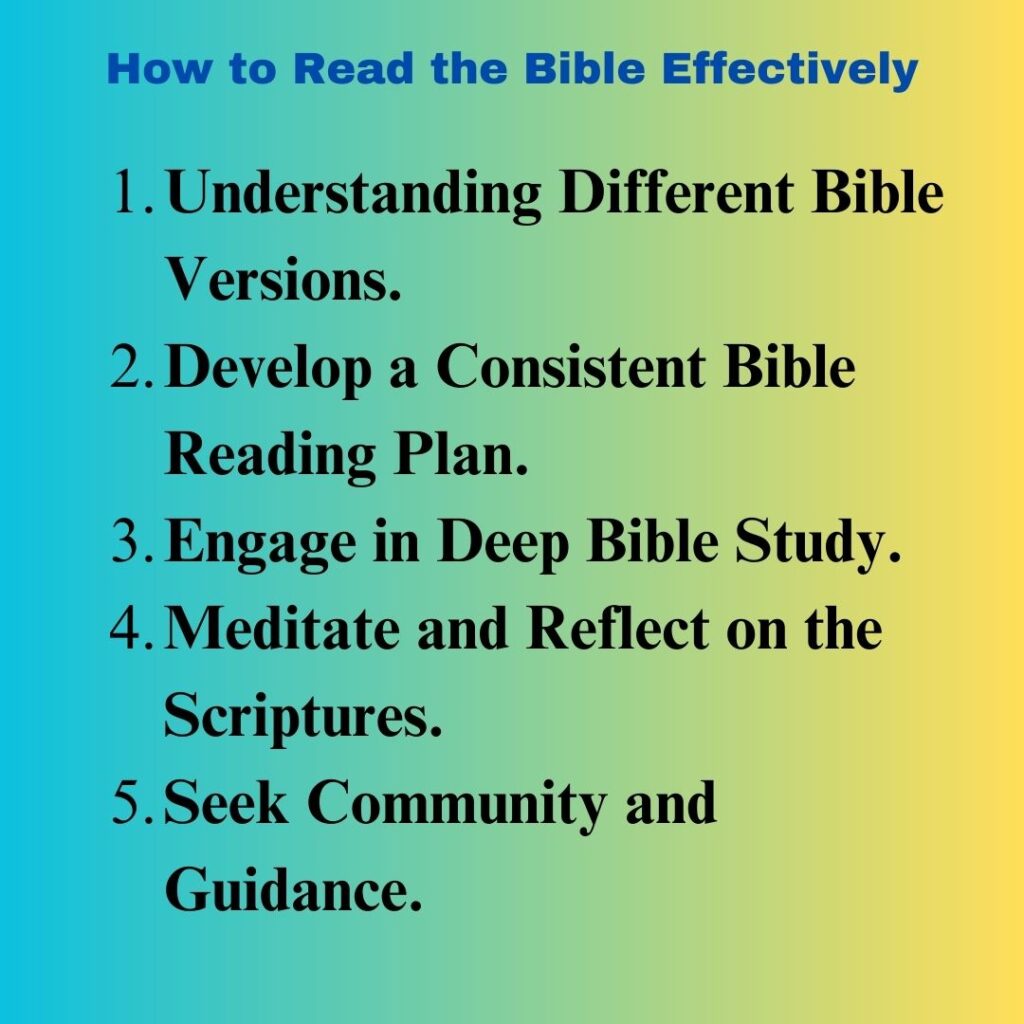Introduction: The Importance of Reading the Bible
The Bible, one of the most influential books in human history, offers timeless wisdom, spiritual guidance, and philosophical insight. Regardless of your reason for exploring this ancient text – whether you’re seeking spiritual enlightenment, academic understanding, or a deeper appreciation of literature – knowing how to read the Bible effectively can maximize its benefits.
Understanding Different Bible Versions
Before we delve deeper, it’s important to understand that there are various versions of the Bible, each with different interpretations and language styles. Common versions include the King James Version (KJV), New International Version (NIV), English Standard Version (ESV), and the New Living Translation (NLT). Familiarize yourself with these versions and select the one that resonates with your reading style and understanding.
Choose the Right Bible Version for You
The choice of Bible version is important for effective reading. Some versions prioritize word-for-word translation from original texts (like the ESV), while others focus on thought-for-thought translation for easier understanding (like the NLT). If you’re a beginner, choosing a version that simplifies ancient language might be helpful.
Develop a Consistent Bible Reading Plan
Create a Reading Schedule
Establishing a routine can significantly enhance your Bible reading. Set aside a specific time each day for reading. Consistency fosters a habit, allowing you to absorb and comprehend the teachings of the Bible more effectively.
Decide What to Read
The Bible is divided into the Old Testament and the New Testament, each with different books. You might decide to start from Genesis and work your way to Revelation, or you may prefer thematic or topical reading. The choice ultimately depends on your personal goals and interests.
Engage in Deep Bible Study
Use Bible Study Tools
There’s a plethora of Bible study tools available, both online and offline, including commentaries, dictionaries, and concordances. These tools provide additional context and can help you decipher complex passages, making your reading more fruitful.
Context is Key
Understanding the historical, cultural, and literary context of Bible passages can significantly enhance your comprehension. Always try to grasp the author’s intention, the audience, and the circumstances surrounding the text.
Meditate and Reflect on the Scriptures
The Importance of Meditation in Bible Reading
Meditation allows the teachings of the Bible to sink into your heart and mind. Take time to reflect on the verses you read, and try to apply them in your daily life.
Journal Your Thoughts and Questions
Keeping a Bible study journal can enhance your understanding and retention. Note down insights, reflections, and questions that arise during your reading. This will not only help you remember key points but also encourage active engagement with the text.
Seek Community and Guidance
Join a Bible Study Group
Studying the Bible in a group can offer diverse perspectives and interpretations. It’s a chance to learn from others, ask questions, and share insights.
Seek Guidance from a Spiritual Mentor
If you’re part of a religious community, seeking guidance from a pastor, priest, or spiritual mentor can be beneficial. They can help clarify your doubts and guide you in your spiritual journey.
Conclusion: The Journey of Reading the Bible
Reading the Bible is a journey, one that requires patience, persistence, and openness. As you delve into this sacred text, remember that effective reading comes not just from understanding the words on the page, but from applying the lessons in your life. By following the tips outlined above, you can read the Bible more effectively, enriching both your spiritual and intellectual life.

Author

Alona Smith is a devoted follower of Jesus Christ who believes that life’s true purpose is found in knowing Him and making Him known. She is passionate about sharing God’s Word with clarity and compassion, helping others see the beauty of the gospel of grace revealed through the Apostle Paul.
Grounded in Scripture and led by the Spirit, Alona seeks to live out her faith in practical ways—showing kindness, extending forgiveness, and walking in love. Whether serving in her local church, encouraging a friend in need, or simply living as a light in her community, she strives to reflect Christ in both word and deed.




